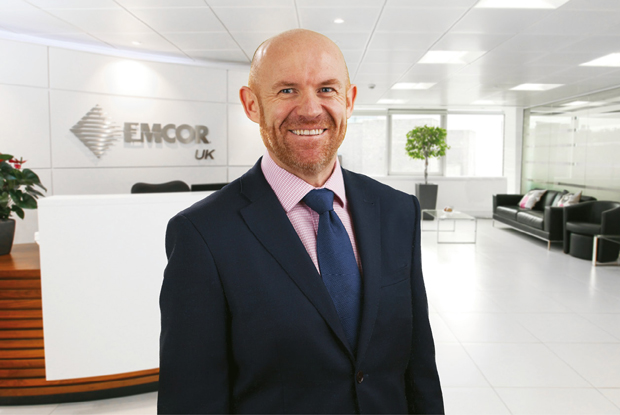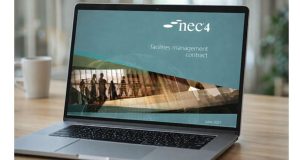The FM sector often complains it is not valued enough by the C suite, but Ian Meaden, Chief Operating Officer of EMCOR UK reminds Sara Bean how far the sector has come and why key account management has contributed to its success
Ian Meaden, Chief Operating Officer of EMCOR UK is well placed to help chart the trajectory of FM over the last three decades. He has been with facilities provider EMCOR UK since 1987 which he joined as an electrical engineer apprentice at what was primarily an M&E and construction company. Within a year of beginning his apprenticeship however, the company landed one of the first FM contracts of its kind with a large technology company.
He says: “In the early days I don’t think the value of FM delivery was appreciated, as facilities departments reported into HR, the finance department, or even procurement, but fast forward to now and I think the C suite is seeing the real value in what FM can provide, particularly around the workplace.”
From his earliest days in FM, Meaden recognised the importance of cultivating strong relationships with customers; and after moving from electrical engineering into account management roles, he progressed through the company to Operations Director before being appointed Chief Operating Officer last year by CEO Cheryl McCall.
During his long career he’s come to appreciate the important contribution key account management plays in the success of any FM services contract and this has helped shape his thinking as a leader in this space.
“I think that the FM journey may have moved and shifted quite a lot, but the one significant thing that has stuck with me remains that of building relationships and trust with clients that help add value to their organisations.”
COMPLEX ENVIRONMENTS
Around 93 per cent of EMCOR UK’s revenues are from the delivery of complex FM service within regulated and critical environments, encompassing defence and government, utilities, pharma and life sciences, industrial and manufacturing and the burgeoning data centre industry.
Taking each of these sectors in turn, Meaden says EMCOR UK is well placed to support the defence sector in managing its cost pressures, an aging infrastructure, workforce challenges, constraints on areas such as access to data technology and pressure to meet increasingly stringent decarbonisation requirements.
EMCOR UK also has a big presence in the utilities market, ranging from gas to water, where given the latter’s well documented issues there is an increasing drive for infrastructure upgrades while managing existing facilities.
He explains: “The water utilities sector is a very pressured environment, driven by a regulatory programme. Decarbonisation is a major issue, like it is for many industries.”
Meaden argues that whether managing defence and utilities services or pharmaceutical and life sciences, there are common themes, whether in helping clients meet net zero targets, or help them deal with costs challenges.
EMCOR UK also has a substantial manufacturing portfolio, where there is a great focus on reliability, safety and production support. As reported in an FMJ feature last year on EMCOR UK’s partnership with British Sugar, the FM team there is firmly embedded into the production process with every leak or maintenance issue fully recorded and the data used to inform future asset planning.
 Data centres are also on a big expansion journey – resulting in the launch of EMCOR UK’s new Data Centre Operations solution which will be managed by a specialist data centre team covering the full lifecycle of data centre operations, from design, build, management to maintenance. What managing these complex contracts have in common says Meaden: “Is to help shape our thinking around our vision of engineering excellence, because the environments where EMCOR UK is most successful are those difficult to enter kind of facilities.”
Data centres are also on a big expansion journey – resulting in the launch of EMCOR UK’s new Data Centre Operations solution which will be managed by a specialist data centre team covering the full lifecycle of data centre operations, from design, build, management to maintenance. What managing these complex contracts have in common says Meaden: “Is to help shape our thinking around our vision of engineering excellence, because the environments where EMCOR UK is most successful are those difficult to enter kind of facilities.”
Working within critical and highly regulated environments means that health and safety is a priority. Ensuring standards are maintained says Meaden begins with individuals and its workplace culture. EMCOR UK operates a programme called ‘Be there for life,’ designed to set a behavioural culture that is all about doing the right thing at the right time. This means, says Meaden, “staying within your lane”.
“People don’t like to be told to stay in their lane, but from a safety perspective, working in these types of environments it’s imperative. We spell out that, ‘These are the rules. These are the guidelines, do not step outside of them’. It is what we call a ‘just culture’, rewarding good behaviour and being responsible for things when they don’t quite go to plan.
“We have a review process where any incident that happens is logged as a lost time incident and we bring everybody onto that review to ask, ‘what do we think happened? Why do we think it happened? What are we going to do to prevent it for next time?’ From a safety perspective, we start from a position where everything is avoidable.
“As a result, our safety performance speaks for itself, this year we’ve again won the RoSPA (Royal Society for the Prevention of Accidents) 2025 Facilities Management Sector Award and looking at our safety data, in 2024 we had only six lost time incidents across all of our contracts.”





